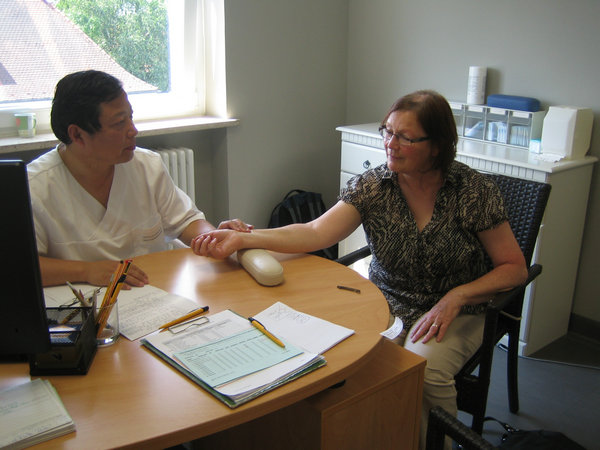TCM's popularity growing abroad
China Daily by Cang Wei, June 1, 2017 Adjust font size:
 |
| Pulse diagnosis is one of the first steps of traditional Chinese therapy. The age-old method is now being embraced by more foreigners. [Photo provided to China Daily] |
In March, the university signed a memorandum of understanding with Royal Melbourne Institute of Technology University in Australia to boost cooperation on TCM.
"The signing of the memorandum ... provides both Chinese and Australian people an opportunity to share the benefits of Chinese medicine," Hu says.
Liu Nongyu, a professor with the university, worked in Mexico for two years and Hong Kong for 10 years.
He helped to develop the School of Chinese Medicine in the University of Hong Kong, where he gave acupuncture lessons.
"Many local people lacked knowledge about traditional Chinese medicine when Hong Kong returned to China in 1997. But after 20 years of development, most public hospitals in Hong Kong now have specialized TCM departments," Liu says.
Founded in 1954, Nanjing University of Chinese Medicine has been renowned as "the cradle of China's higher education in traditional Chinese medicine".
It trained the first batch of modern teachers, compiled the first edition of textbooks, and helped cultivate the earliest academicians in TCM, after the founding of New China.
It is also one of the first Chinese medicine institutions authorized by the Ministry of Education to enroll international students, where they learn acupuncture, Chinese herbal medicine, cupping therapy and classical prescription.
Now, many professors and teachers from the university are working as visiting professors in universities and Confucius Institutes overseas to spread TCM.
However, Hu says that many difficulties need to be resolved to better spread TCM, including overcoming language barriers and improving textbooks.
"We don't have too many teachers who can give lessons in English. So, we are cooperating with institutions in Hong Kong and Taiwan, where bilingual professionals are easier to find, to resolve the language problem."